Iris Lavell's Blog, page 10
September 11, 2013
The Australian Society of Authors National Congress
 I'll be heading off to the National Writers Congress held in Sydney from Thursday 17 October to Saturday 19 October this year. The Congress is the first held by the Australian Society of Authors. It will explore the changing landscape for writers and will discuss ideas and answers to guide the future of authorship in Australia.
I'll be heading off to the National Writers Congress held in Sydney from Thursday 17 October to Saturday 19 October this year. The Congress is the first held by the Australian Society of Authors. It will explore the changing landscape for writers and will discuss ideas and answers to guide the future of authorship in Australia. There is an illustrious line-up of authors and industry professionals speaking, including a keynote address by Anna Funder, author of All that I Am, winner of the 2012 Miles Franklin Literary Award. Take a look at the link provided. Would love to see you there!
Published on September 11, 2013 19:10
September 8, 2013
A post courtesy of BLPG member Reg
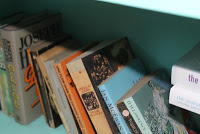 John Gardner on Writing
John Gardner on WritingIf I could only have two books by writers on writing, they would be John Gardner’s On Becoming A Novelist and his The Art Of Fiction. The following description of the nature of the writer comes from page 34 of the 1999 Norton edition of the first book above.
“Another indicator of the novelist’s talent is intelligence – a certain kind of intelligence, not the mathematician’s or the philosopher’s but the storyteller’s – an intelligence no less subtle than the mathematician’s or the philosopher’s but not so easily recognized.
Like other kinds of intelligence, the storyteller’s is partly natural, partly trained. It is composed of several qualities, most of which, in normal people, are signs of either immaturity or incivility: wit (a tendency to make irreverent connections); obstinacy and a tendency towards churlishness (a refusal to believe what all sensible people know to be true); childishness (an apparent lack of mental focus and serious life purpose, a fondness for daydreaming and telling pointless lies, a lack of proper respect, mischievousness, an unseemly propensity for crying over nothing); a marked tendency toward oral or anal fixation or both (the oral manifested by excessive eating, drinking, smoking and chattering; the anal by nervous cleanliness and neatness coupled with a weird fascination with dirty jokes); remarkable powers of eidetic recall, or visual memory (a usual feature of early adolescence and mental retardation); a strange admixture of shameless playfulness and embarrassing earnestness, the latter often heightened by irrationally intense feelings for or against religion; patience like a cat’s; a criminal streak of cunning; psychological instability; recklessness, impulsiveness and improvidence; and finally, an inexplicable and incurable addiction to stories, written or oral, bad or good. Not all writers have exactly these same virtues, of course. Occasionally one finds one who is not abnormally improvident.”
There you have it. Make a little allowance that this came from the 1970’s – allowance only in the way that thoughts are expressed. Gardner is describing the serious literary novelist, not the much more desirable commercial animal.
Published on September 08, 2013 20:14
September 5, 2013
Guest Post - Emily Paull on the Joys of Book Blogging
The delightful Emily Paull has agreed to do a guest post for us this weekend. If the quality of her blogging is an indication, it won't be too long before we're seeing her work displayed in the best bookshops. Thanks Emily. Hope you can get along to the Book Length Project Group sometime when work doesn't call you away.
Book Blogging: More than Just an Awesome Way to Get Free Books
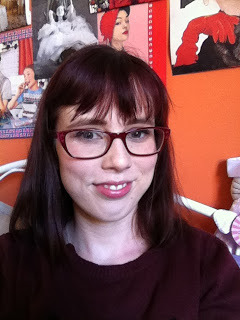 by Emily Paull
by Emily Paull
I have been blogging now for about five years, and one of the things I have discovered is that you get about as much out of it as you put in. In the early days of The Incredible Rambling Elimy , I made a point of blogging every Tuesday, even when I didn’t feel like I had anything to say. It was just good to have that regular outlet… emphasis on the out. I keep a journal, but nobody is ever supposed to read that. I can write what I want. Keeping a blog is different. You have to think about your audience, in a sense, if you want people to come back and read your work again and again. Yes, this is still true if the only people in that audience are your Grandparents. (Hi guys!)
True, there have been moments when I should have just kept my mouth shut. Anyone else remember that post in which I listed Stephenie Meyer among my idols because I was so amazed that all these teenage girls loved her so much? Yeah… But I think it was Foucault who said that ideas change, and it’s important that you learn and change your thinking over time. By not deleting my Stephenie- loving drivel, I’m holding myself accountable to that.
But why book-blogging specifically? Why is that so great for an emerging wrier to get involved in?
Well first of all, it’s fun. I love to read, and I love to talk about what I’ve been reading, and having a book blog basically allows me to do this on a weekly basis. It’s usually a labour of love, unless I am reviewing something that I just didn’t connect with, which happens, and is pretty much totally dependent on where my head is at. You know, unless the writing is terrible. Once I dropped the weekly format, I found myself at a loss for what to talk about for a while, and I thought ‘Well, what do I enjoy? What am I good at?’ and the answer was reading.
I stared in 2010 with a series of word vomit style rants called Thoughts On which was a way of collecting my thoughts about the books I had to read for uni. There were a lot in that particular semester because I was doing two major literature units and I think I had to read seventeen books in twelve weeks, plus analysis. At first, I was thinking that no one was going to want to read it, but I did it anyway because it was better than not blogging. Then I remember getting a Facebook message from a friend of a friend who told me she was really keen to read Devil’s Cub by Georgette Heyer after reading what I’d said about it. First thing I thought was ‘This is weird.’ The second was ‘I could get used to this.’ It was wonderful.
And I kept going from there, supplementing my own writing with blogging about the books I’d been reading. One of the main things people say about learning to write is that you have to read a lot, and this practise really forces you to read critically. You have to think about what makes you as a reader tick, and what works and what doesn’t. Good writers borrow but great writers steal- and book bloggers learn how to borrow and steal by reviewing. I’ve found this kind of blogging the most stimulating for me, because I am very conscious about blogging about my own writing. Someone once said that a lot of modern writing is just navel gazing and I don’t want to do that. I don’t want my author platform to be all about my writing life, because I’m not published yet, and I am pretty sure that most readers out there don’t care about me (yet), but book reviews are something my people (book reading people) care about and it connects me with the kinds of readers I hope will one day be interested in my book. I do occasionally blog about my writing, and lately I have been blogging about reading and bookselling issues, but since last year, when I did an Honours thesis on Western Australian writing, and got my job at a bookstore, the reviewing has had a definite focus to it.
Book blogging has also given me the confidence to approach authors and publishing types and say, “Hi, I’m Emily. I’m a writer, a book blogger and a bookseller, and I’d love to chat.” I hand them my business card, and sometimes they offer me books to review, sometimes I get an email address out of it, and sometimes these people even read the blog and leave a comment. That feeling that the network is growing give me hope. Maybe one day I’ll introduce myself to the person who will publish my book in this manner, but for now, we will have to wait and see.
Book Blogging: More than Just an Awesome Way to Get Free Books
 by Emily Paull
by Emily PaullI have been blogging now for about five years, and one of the things I have discovered is that you get about as much out of it as you put in. In the early days of The Incredible Rambling Elimy , I made a point of blogging every Tuesday, even when I didn’t feel like I had anything to say. It was just good to have that regular outlet… emphasis on the out. I keep a journal, but nobody is ever supposed to read that. I can write what I want. Keeping a blog is different. You have to think about your audience, in a sense, if you want people to come back and read your work again and again. Yes, this is still true if the only people in that audience are your Grandparents. (Hi guys!)
True, there have been moments when I should have just kept my mouth shut. Anyone else remember that post in which I listed Stephenie Meyer among my idols because I was so amazed that all these teenage girls loved her so much? Yeah… But I think it was Foucault who said that ideas change, and it’s important that you learn and change your thinking over time. By not deleting my Stephenie- loving drivel, I’m holding myself accountable to that.
But why book-blogging specifically? Why is that so great for an emerging wrier to get involved in?
Well first of all, it’s fun. I love to read, and I love to talk about what I’ve been reading, and having a book blog basically allows me to do this on a weekly basis. It’s usually a labour of love, unless I am reviewing something that I just didn’t connect with, which happens, and is pretty much totally dependent on where my head is at. You know, unless the writing is terrible. Once I dropped the weekly format, I found myself at a loss for what to talk about for a while, and I thought ‘Well, what do I enjoy? What am I good at?’ and the answer was reading.
I stared in 2010 with a series of word vomit style rants called Thoughts On which was a way of collecting my thoughts about the books I had to read for uni. There were a lot in that particular semester because I was doing two major literature units and I think I had to read seventeen books in twelve weeks, plus analysis. At first, I was thinking that no one was going to want to read it, but I did it anyway because it was better than not blogging. Then I remember getting a Facebook message from a friend of a friend who told me she was really keen to read Devil’s Cub by Georgette Heyer after reading what I’d said about it. First thing I thought was ‘This is weird.’ The second was ‘I could get used to this.’ It was wonderful.
And I kept going from there, supplementing my own writing with blogging about the books I’d been reading. One of the main things people say about learning to write is that you have to read a lot, and this practise really forces you to read critically. You have to think about what makes you as a reader tick, and what works and what doesn’t. Good writers borrow but great writers steal- and book bloggers learn how to borrow and steal by reviewing. I’ve found this kind of blogging the most stimulating for me, because I am very conscious about blogging about my own writing. Someone once said that a lot of modern writing is just navel gazing and I don’t want to do that. I don’t want my author platform to be all about my writing life, because I’m not published yet, and I am pretty sure that most readers out there don’t care about me (yet), but book reviews are something my people (book reading people) care about and it connects me with the kinds of readers I hope will one day be interested in my book. I do occasionally blog about my writing, and lately I have been blogging about reading and bookselling issues, but since last year, when I did an Honours thesis on Western Australian writing, and got my job at a bookstore, the reviewing has had a definite focus to it.
Book blogging has also given me the confidence to approach authors and publishing types and say, “Hi, I’m Emily. I’m a writer, a book blogger and a bookseller, and I’d love to chat.” I hand them my business card, and sometimes they offer me books to review, sometimes I get an email address out of it, and sometimes these people even read the blog and leave a comment. That feeling that the network is growing give me hope. Maybe one day I’ll introduce myself to the person who will publish my book in this manner, but for now, we will have to wait and see.
Published on September 05, 2013 17:03
September 4, 2013
We Continue our Osprey Love Affair...
BLPG member Margaret O'Brien has sent through some more of her great photographs of ospreys for our enjoyment. (Photographs copyright Margaret O'Brien)
 I was on the river in my kayak when I saw this osprey patrolling for fish. It's talons opening and closing continuously, it made fine adjustments with its wings, rising and falling in the air and never taking its eyes off its prey before eventually plunging feet first into the water.
I was on the river in my kayak when I saw this osprey patrolling for fish. It's talons opening and closing continuously, it made fine adjustments with its wings, rising and falling in the air and never taking its eyes off its prey before eventually plunging feet first into the water.
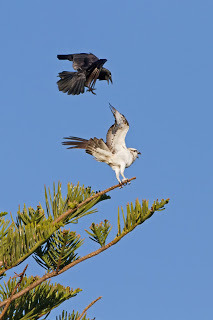
It isn’t only Willie wagtails that aren’t fond of ospreys. An Australian Raven and its mate (out of the picture) eventually succeed in driving this one out of the tree.
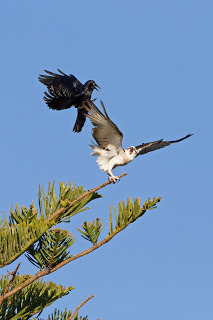
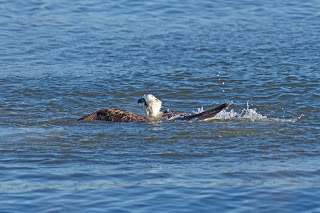 Osprey emerging from a dive. A fishing osprey is one of Nature's most spectacular sights, the water exploding for several feet around the bird, in part due to the displaced water, but in instances where it plunges into a school of fish it causes the school to scatter in a chaotic frenzy.
Osprey emerging from a dive. A fishing osprey is one of Nature's most spectacular sights, the water exploding for several feet around the bird, in part due to the displaced water, but in instances where it plunges into a school of fish it causes the school to scatter in a chaotic frenzy.
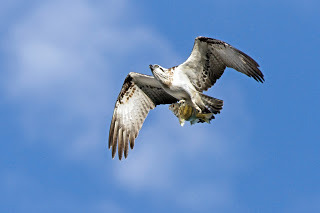
With its prey in its talons, the osprey climbs about 20' into the air where it shakes itself vigorously to shed its feathers of water. It then realigns the fish to face forward to reduce aerodynamic drag before flying to a favourite perch to eat it or to deliver it to the nest.
 I was on the river in my kayak when I saw this osprey patrolling for fish. It's talons opening and closing continuously, it made fine adjustments with its wings, rising and falling in the air and never taking its eyes off its prey before eventually plunging feet first into the water.
I was on the river in my kayak when I saw this osprey patrolling for fish. It's talons opening and closing continuously, it made fine adjustments with its wings, rising and falling in the air and never taking its eyes off its prey before eventually plunging feet first into the water.
It isn’t only Willie wagtails that aren’t fond of ospreys. An Australian Raven and its mate (out of the picture) eventually succeed in driving this one out of the tree.

 Osprey emerging from a dive. A fishing osprey is one of Nature's most spectacular sights, the water exploding for several feet around the bird, in part due to the displaced water, but in instances where it plunges into a school of fish it causes the school to scatter in a chaotic frenzy.
Osprey emerging from a dive. A fishing osprey is one of Nature's most spectacular sights, the water exploding for several feet around the bird, in part due to the displaced water, but in instances where it plunges into a school of fish it causes the school to scatter in a chaotic frenzy.
With its prey in its talons, the osprey climbs about 20' into the air where it shakes itself vigorously to shed its feathers of water. It then realigns the fish to face forward to reduce aerodynamic drag before flying to a favourite perch to eat it or to deliver it to the nest.
Published on September 04, 2013 21:13
September 2, 2013
The right to represent
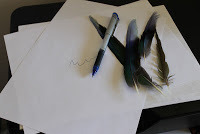 When it comes to writing, a fairly important question is what to write about. What do I have the right to write about? What do I want to write about? What doesn't get written about, and why?
When it comes to writing, a fairly important question is what to write about. What do I have the right to write about? What do I want to write about? What doesn't get written about, and why?I don't have the answer, but do believe that representation in the form of stories has power. It can influence perceptions, beliefs, and the way in which we experience reality. Old news you might say, and it is, but knowing this doesn't alter the unremitting struggle that goes on to win hearts and minds over to a particular cause through persuasive rhetoric. It seems like a never-ending competition.
During an election, the stakes are high, and it's difficult to know what is really motivating particular politicians, and if they win power, what the effect of their ability to control the wheel will be. Those big things, policies and laws do matter, because they change lives, the trajectory of lives, and sometimes even whether those lives will continue or not. That's a lot of power in the hands of a small number of people who are sometimes lacking a little bit of insight, who might have vested interests that conflict with those of the people they purport to represent, and who are sometime less than kind. On the other hand, there are some good and dedicated people in there, in the mix. I think, hope, they are mostly that. We can't rely on the old media to tell us which is which, because they too have vested commercial and personal interests. Perhaps we all do.
I don't want to get big "P" Political here. It's not my place and I don't have a crystal ball. I don't know what is best in the grand scheme of things. The machinations are complicated and sometimes the counter-intuitive leads to good outcomes for people. My own vote will go to the parties that I think care for the people and for the world. But we each have a right to make up our own mind about these things. Each time. They're political parties, not football teams.
So, what is the place of a writer in all of this? That is a question we can presume to ask. What kind of issues and characters can we explore in our works of fiction? Do the issues need to be those that directly affect us? Do the characters need to be of our group, our class, gender, race, nationality, experiential base? Some might say yes - write about what you know, and how can you really know unless you have experienced something? Polemical writing in fiction is bad writing, some might say. There appear to be some unstated no-go areas, which act as a way of closing down any further understanding. And if you write about love, good outcomes, for example, don't expect to be taken seriously.
My concern here is that the tools of representation are not evenly distributed, although the Internet might be helping. Even so, formal education and the space and support in life to write, maybe even the luxury to consider the bigger picture, is not evenly distributed. This is the problem with saying we need to write what we know. Who will speak up for those whose voice is absent? We are all connected after all, and we can write about our relationships with others. A related question - what responsibility do we have to be conscious of the likely outcome of the words we send out there?
My feeling is that ethics matter. What we write about matters. Our responsibility as writers is to try to tell the story well, with good research, and with a good heart. And to listen and be prepared to change our views.
Published on September 02, 2013 20:29
August 29, 2013
New pictures of ospreys on Margaret O'Brien's project post
Published on August 29, 2013 16:56
August 27, 2013
My Talk at Club Murdoch
 Hello all, just a reminder that I will be speaking at Club Murdoch, Murdoch University (South Street Campus, Western Australia), about Elsewhere in Success and my writing process, on Tuesday September 3rd from 6pm-8pm. Light refreshments will be served. If you are intending to attend you can RSVP on alumnievents@murdoch.edu.au
Hello all, just a reminder that I will be speaking at Club Murdoch, Murdoch University (South Street Campus, Western Australia), about Elsewhere in Success and my writing process, on Tuesday September 3rd from 6pm-8pm. Light refreshments will be served. If you are intending to attend you can RSVP on alumnievents@murdoch.edu.au Looking forward to seeing you there
Published on August 27, 2013 02:38
August 24, 2013
Book Length Project Group Member, Margaret O'Brien's project on ospreys
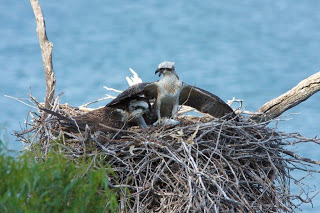 Old Ma Osprey
Old Ma OspreyMargaret O'Brien is writing a non-fiction natural history book focussing on one breeding season in the lives of a family of ospreys in Perth, Western Australia. Based on her own observations, the text is complemented throughout with the author's photographs of an osprey family in crisis.
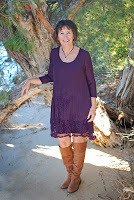 Author Margaret O'Brien
Author Margaret O'Brien
Published on August 24, 2013 22:32
And another thing! ... politics rant alert (apologies booklengthers - back to things writing soon)

I have another concern, related to the mentality that has led to cuts in the Health Department - our current State Government thinking in relation to funding human services. Doesn't it make sense to work at the prevention rather than the patch-up end of things?
Are they swimming in complacency with the knowledge of another few years before an election????
So now the thing is to cut staff in SCHOOLS of all things, and even more ridiculous, teachers and teacher assistants.
Was it the full moon? I just don't get it. Last time I looked (i.e. last week) the schools needed more teachers and teacher assistants in the classrooms, not less. Maybe education just isn't important. That can be the only explanation, it seems, for firstly turning down squillions offered by the federal government for education because they were batting for the other team, and now cutting the capacity to enable kids to learn by reducing the teaching and support staff in the schools.
It's people we're talking about here, vulnerable people in the health system, kids. Just wondering if anyone cares up there at the big house on the hill.
Published on August 24, 2013 03:23
August 21, 2013
Paper post from the Inaugural Elizabeth Jolley Conference held last Friday at the Esplanade Hotel in Fremantle
 The Elizabeth Jolley Conference was linked to the Romance Writers Conference
The Elizabeth Jolley Conference was linked to the Romance Writers ConferenceExploring women and modalities of power in fiction: escaping the straightjacket of genre into digital space Lynn Allen
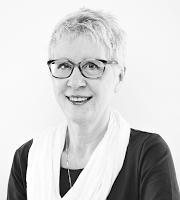 ABSTRACT There are many modalities of power: personal, professional, political, domestic, social, cultural, financial, knowledge, physical, artistic. These different domains can be investigated in multiple ways in fiction. Indeed when it comes to exploring women and power, fiction can offer multiple perspectives and challenging insights that the ’proof’ concept in non-fiction makes difficult, if not impossible. As many feminists have quoted, ‘the personal is political’ and often women find an irresolvable tension between a desire for external recognition and the need for loving relationships, between demanding social power and being the peace-keeper.
ABSTRACT There are many modalities of power: personal, professional, political, domestic, social, cultural, financial, knowledge, physical, artistic. These different domains can be investigated in multiple ways in fiction. Indeed when it comes to exploring women and power, fiction can offer multiple perspectives and challenging insights that the ’proof’ concept in non-fiction makes difficult, if not impossible. As many feminists have quoted, ‘the personal is political’ and often women find an irresolvable tension between a desire for external recognition and the need for loving relationships, between demanding social power and being the peace-keeper.The categorising model of genre applies organising principles that militate against exploring the complexity of women’s power. For whose benefit has the notion of genre been invented and propagated? Classification systems, whether for libraries or biological species, are not value free and in both those cases the origins belong in earlier centuries.
When writing my novel, Illusion, I became aware of the limitations of the idea of genre. The novel does not fit easily into the category of political thriller, romance or literary fiction, far less the notion of chick lit. The more general women’s fiction was equally unappealing. I began to explore the idea of the digital space only to discover the genre taxonomy had migrated from the physical book publishing industry to the web, albeit with sub-genres .
This paper explores the idea of moving beyond genre in the digital space, asking what are the possibilities for women writers to use that space to challenge boundaries, to connect outside the limitations imposed by the publishing and bookselling industry and, in so doing, to enter a space where the ‘medium is political.’
Outline according to abstract Intro slide INTRODUCTION
Thank you for the opportunity to share some of my ideas with you today. They are part of a journey and I am happy to offer my questions and some of my tentative answers with a suggested model of the novel in digital space. As Virginia Woolf said,
When a subject is highly controversial... one cannot hope to tell the truth.One can only show how one came to hold whatever opinion one does hold. One can only give one's audience the chance of drawing their own conclusions as they observe the limitations, the prejudices, the idiosyncrasies of the speaker. POWER
There are many modalities of power: personal, professional, political, domestic, social, cultural, financial, knowledge, physical, artistic.
These different domains can be investigated in multiple ways in fiction. Indeed when it comes to exploring women and power, fiction can offer multiple perspectives and challenging insights that the ’proof’ concept in evidence-based writing makes difficult, if not impossible. As many feminists have quoted, ‘the personal is political’ and women can find irresolvable tensions between the desire for external recognition and the need for loving relationships.
Women have always told stories. As Virgina Woolf said, ‘for most of history Anonymous has been a woman.’ But it is not their stories that become a culture’s canonical texts. The Iliad, The Odyssey, Gilgamesh, The Bhagavhad Ghita, The Bible – the pillars of knowledge are masculine. Women’s stories are more likely to be found underground in the spiritual realms. In these archetypal spaces, conflict and confusion can reign. It is these conflicts, these battles of will and seeking of identity that interest me. Shall I write of the warrior queen or the keeper of the home: Athena or Penelope? Shall I explore the darkness or the bringer of the light: Persephone or the Vestal Virgin? The mother or the lover: Virgin Mary or Aphrodite? Goddess of birth and nature or destroyer: Diana or Medusa?
Women’s mythic heritage is rich and many of the tales explore the nature of feminine power. Power that destroys men and so the women must be punished: to speak of wisdom that no one can hear (Cassandra); to bring misfortune to men (Pandora and Eve); to fail to follow instructions, demonstrating an annoying capacity for disobedience (Lot’s wife; Eurydice).Anne Summers has captured the equivocal norms in relation to Australian women in her book Damned Whores and God’s Police (1974, 1995, 2002). The recent controversies over the use of the word mysogny in Australia shows that we are yet to arrive at a comfortable place where women can discuss the unwritten and unspoken challenges that power presents. Why is a powerful woman in all her guises so threatening to men and, even more puzzling, to other women?
I wonder how many manuscripts that tackle these issues find an agent and then fail to get past the acquisitions editor? Are such texts not being written or is one of the problems the straightjacket of genre? GENRE CONCEPT
Genre means ‘kind’ or ‘sort’ from the Latin genus. Genres are formed by conventions, traditions, biases, ideologies and serve as a means to structure things according to the dominant powers in a society.
Genre is essentially a taxonomy. In science this is useful. Taxonomies grow from agreed scientific research, they are reviewed and revised before the introduction of a new species.Aristotle created the idea of categories of beings and things. Ancient categories of artistic work were few: epic, tragedy, comedy. Much later came the novel and short story. To those were added more and more sub-genres.
For whose benefit was the notion of genre in fiction invented and continued? Classification systems, whether for books in libraries or biological species, are not value free and in both those cases the origins belong in earlier centuries. They were created by white anglo-saxon, Christian males from a hierarchical society where women had narrowly-defined roles and little liberty.
Genre is neither an old nor static concept. It is contextual over time and space. So is genre an unwritten social contract between publisher and reader? Will a reader be disappointed or delighted if a book is shelved in the fantasy section only to find it is detective fiction set in a suburb of Melbourne?
The broad genre, Fiction sits opposite Non-Fiction. Within the category Fiction itself we have Literary and General or Commercial or Mainstream, often with a section for Australia. If we extend the social contract to that between author and publisher, does the publisher’s decision about genre mean if the text is designated Literary rather than General the author should expect short print runs and less money? And readers should expect a more complex read in which nothing much happens? What to say of the category of Women’s Fiction? Why is there not a genre called Men’s Fiction? And why do we need Chick Lit and now Boomer Lit?
The Romance genre is one of the oldest. What might we expect here? Women authors and readers? Unliterary? Formulaic? And who is doing the expecting?
I can’t go into the history of genre definitions here but it is safe to say that when Jane Austen’s books were published they were not seen as a genre. Of course, once you are long dead and well published and if your work survives you can join the eminent writers on the Classics shelves. If you are outstandingly successful these days then you become a genre in your own right. GENRE IN NOVEL WRITING – MY EXPERIENCE
My novel, Illusion, available at smashwords.com, does not fit easily into a genre. Like most budding writers I attended workshops and listened to publishers lay down their law about what I had to do to pass through their hallowed gates. My text is not a political thriller, romance or literary and the notion of chicklit or boomer lit make no sense to me. The idea of women's fiction I find patronising and dismissive.
As I learned more about the e-book world I wondered whether that would be an option but what did I find? The genre-dominating world had migrated from the physical to the digital. True, there were more sub-genres but the logic was the same.
This taxonomy appears to be universal: it dominates the supply chain from agents to editors to publishers, booksellers and reviewing outlets as well as prizes.
While there are interesting pathways in search engines where keywords and tags can be used, I was still left with the question: where did my novel fit in the bibliographic universe? I hope for my audience to be the intelligent reader but there’s no genre for that. I was becoming increasingly convinced that the typical publishing route was closed to me, or perhaps I just didn’t want to knock on the door. The advice from workshops was not encouraging: decide your genre; first time novelists find it hard to get an agent; the novel should be a certain length; it's useful if as an author you are an interesting person and so on.
I began to ask myself some questions:
· who does genre serve?· who did I think my readers might be and how best to reach them? · why set out on a traditional publishing route when all the advice was not to bother?· why do we as writers assume that only the 'best' literature gets published and self-publishing is inferior (they call it vanity publishing as if the publisher's authors have no such characteristic)? BEYOND GENRE INTO DIGITAL SPACE
As I studied publishing on the internet and explored how publishers were using the space, I began to wonder if there was a deeper set of questions to ask. What are the possibilities for women writers to use that space as a subversive activity - to challenge boundaries, to connect with each other and readers in ways unrestricted by the domination of the publishing and bookselling industry?
If we continue with the same genre categories then subconsciously or consciously are we not participating in the perpetuation of the same problems we have in the physical world?If the main transaction is between author and reader through the centrality of the text then what would I have to do to keep all middle-men out of that relationship?
I should mention at this point that I am excluding the topic of making money from my writing. I think producing and sharing a text are totally different transactions to selling the experience. Chris Anderson's book Free explores the concept of saleable versus free products and interactions.
Many studies have shown that women are not the drivers of content on the Internet, especially in spaces like Wikipedia. However, it is true that many women writers have embraced the internet and have their own voices. Blogging, social media, interactive websites - all provide the author with an unmediated voice and contact with readers, but many more authors have their pages on publishers’ websites so they have travelled the well-worn path to traditional publishing first. It is interesting to note some of the authors who have migrated the other way. In June 2013, 5 of the top-selling e-books were self-published. So, these days Margaret Mitchell could have published Gone with the Wind herself and avoided 38 rejections.
I began to muse on the idea that if both gender and genre were barriers to getting published either electronically or physically (as these are controlled by the same mindset as the traditional publishers) what would happen if we pretended there was a tabula rasa? An as yet barely imagined and uncolonised digital space?
I am conscious that I am speaking to genre writers but bear with me. Dispense momentarily with the notion of genre, the notion of a publisher other than yourself and the notion of a novel as a single continuous text to be read linearly. The internet frees us to think in this space but it takes a bit of mind-boggling effort. Will genre become a self-fulfilling mental model if we never challenge it? Will women’s voices always be defined as the ‘other’ if we do not give them primacy in a new space? Or, even better, we create that space and be the powerful players in it. CarrieTiffany, author of Mateship with Birds (2011) said the following:‘To write – to take the work of reading and writing seriously – you must spend a great deal of time alone in a room. … For women to spend time alone ina room, to look rather than be looked at … It means doing something with your mind rather than your body. (quoted in A.Goldsworthy. Unfinished business: sex, freedom and misogyny. Quarterly Essay, no 50, 2013. BORN DIGITAL NOVEL – WHAT DOES THAT MEAN?
We are witnessing bookshops closing, publishers merging, sales of e-books outstripping paperbacks on Amazon's kindle alone, multiple reading platforms that are mobile and always on, competing immersion experiences like downloads of film, gaming and TV shows. What is the future of the novel in this space? And how will we ensure that women's voices thrive in this space? And how will we create experiences that enable the slow read as well as the dipping in or even a serialisation experience as well as the added extras that typically come with digital media, whether those are access to websites, conversations with the author, free or for sale additional extras.
My first novel, Illusion , is a traditional novel: a linear text with parts and chapters designed to be read sequentially. It is 200,000 words long (so no publisher would be interested, I was told); it is a first novel (even less able to get published); is about women, power and leadership in the WA public sector (boring on at least four fronts, I was told); and I am an older woman with an older woman as my protagonist (may as well give up altogether). I published Illusion myself as an adventure so I could learn about electronic formats and the processes needed. It is on smashwords.com and I can't speak too highly of the manuals that are provided to help authors load their work. It's had more than 2700 downloads and I have done little marketing save adding details to my email signature and a short note on my professional website and mentioning it in my various professional roles.
Now, I don't know whether it's been read but then I wouldn't know that if it were a physical book. I have had several emails from around the world telling me they enjoyed it.I work professionally in the field of creative systems thinking and have a thinking methodology that I teach and use in consulting, called ariadne ( for more info see 361degrees.com.au). One day a friend suggested to me that the ariadne workbook could be an app so I explored apps.
I had been asking myself, what would a 'born digital novel' look like? I then asked myself what would a novel look like as an app? One day I found Touchpress [www.toucpress.com], a very interesting publisher that is producing apps as amazing experiences, such as T.S.Eliot’s The Wasteland. Here we have a text that can be read as a long poem, but we also have images of WHAuden's annotations, audio readings of the poem including by Eliot himself, detailed footnotes explaining the symbology and mythical references etc.
What genre does this app fit into? Poetry; literary criticism; performance; English cultural studies; classical studies? All together in this one app, and being added to as we speak - a living, organic object that can be viewed from many perspectives and is open for expansion and easy downloaded updates.
Other options that could be included in this ebook/app space are text-to-voice; hyperlinks to related websites; expanded dictionaries and footnotes; pictorial experiences; interactive commentary or collaborative story-building, to name but a few.
My journey has been to explore the e-book as linear text with my first novel but now I am exploring a wider and richer experience for the readers of my second novel but am thinking about how to produce that as I write the first draft. To be self-conscious about the process as well as content, being open to possibilities yet uncreated is a different - and perhaps mind-splitting and certainly more time-consuming - experience. This is, to take a concept from my thinking methodology, a truly emergent process on multiple levels because not only do I not know how my story will end; I do not know what formats it will take.
For me, 'born digital' does not mean that I type my first draft on a computer. In fact, I write my first draft by hand in notebooks in coffee shops. What I am doing is gathering what one author calls my pre-writing and my research into packages as I work. I am also keeping a writer's journal on the processes and ideas that come up from research, conversations and reading. The question that keeps bothering me is: if we were to look at the available media and invent the idea of a story-telling and story-sharing space what would it look like? Without Gutenberg in the 1450s we would not have had the idea of widely available books. In those days widely available meant the church and rich families for these were enormously expensive objects. It would not be till the 18th and the 19th centuries that the popular novel would be born, dependent on cheaper production and a readily available literate populace. We now have a digitally literate populace. Yet, when giving away his books, Ian McEwan commented in The Guardian in 2005: Cognitive psychologists with their innatist views tell us that women work with a finer mesh of emotional understanding than men. The novel - by that view the most feminine of forms - answers to their biologically ordained skills. … Reading groups, readings, breakdowns of book sales all tell the same story: when women stop reading, the novel will be dead.(http://www.theguardian.com/books/2005...) The novel has been seen often as woman's domain, and women are still the majority of novel buyers and readers. Interestingly older women are embracing e-book readers at a fast rate. Interesting too that as you go to writers festivals you find the majority of speakers are men and the majority of the audience are older women. I’ve also noticed what seems to be a disproportionate number of novels have a child or a male as the protagonist. So why are there so few novels published where the central character is an older woman? Are they not being written or not being published?
Thus, if older women are increasingly happy with their ipads, Kindles and ebooks, would they be open to new digital experiences - and I don't mean facebook and twitter. I mean a slow read/extended read/discussion-deep experience. Women build communities wherever they go so what of global digital communities built around novels of ideas and change. Could this be where the feminine principle would re-emerge, through women's stories. But perhaps I wax too lyrical. THE NOVEL AS APP
I'd like now to turn to the idea of the novel as app.
Let's look at a definition of an app. Simply defined it usually refers to application software that is a small specialised program you can download onto your smartphone or tablet or computer. While in the past they have been generally used for officework, databases, process control or design, with the rise of mobile technologies they have become smaller programs with more intuitive interfaces.
An app of the type I want to talk about will typically have some content provided, some facility for adding content and some kind of interactive experience. Regular updates may or may not be included as well as connections to other apps and websites.However, the word app is bothering me and if we are to create a new space then it needs its own language. To show you how my thinking has evolved to date, I will share with you a diagram of what I call a “Story-Sharing Space’ for my second novel, whose working title is Emergence. Let me walk you through a series of spaces that attempt to describe the multiple levels of this space, using systems theory: Firstly, the Text Space. Here is the manuscript with seven parts with chapters that can be read sequentially as a traditional text.
Secondly, The Expanded Text Space. Here are textual objects referred to in the novel but contained in greater detail than possible in the text. Here are found notebooks, letters, speeches, bibliographies of one of the characters, a short story written by one of the characters, backstory from the first novel, Illusion , if the reader hasn’t read that book, synopsis of events between the two novels. These items can be read or ignored or dipped into at different times. They could all be read before reading the text.
Thirdly, The Supplementary Text Space. Here are found items that would normally be used by the writer to make sense of the story’s finer details. Character list; chronologies; lists of organisations; locations; houses; films or books or music referred to in the text.
Fourthly, The Author Space. Here the author can include whatever she wishes. Audio; video; website; notes on processes of writing; commentary on real events; books found useful during research.
Fifthly, The Reader Space. Here are possibilities for interaction between author and reader; between reader and reader; conversations on any items in the first four spaces. This is a dialogic space. A ‘Narrative Commons’ for one text and one author that could indeed be added to include all the authors work from multiple spaces. CONCLUSION I would like to conclude with my own note of caution. Maybe all this will just be a circular adventure and like TS Eliot says,
‘We shall not cease from explorationAnd the end of all our exploringWill be to arrive where we startedAnd know the place for the first time.” ― T.S. Eliot, Four Quartets
I have an iPad and a Kindle but I also buy books from around the world as well as locally. Whatever new spaces evolve we need to remember the essence of is still story, and women’s stories – telling, reading, listening and sharing. Nevertheless, as Marshall McLuhan said, ‘the medium is the message’ – and the new media are worth exploring to see how we share new messages as well as the old stories that are crying to be told. Maureen Murdock suggests, ‘Because so much of womens’ truth has been obscured by patriarchal myths, new forms, new styles and a new language must be developed by women to express their knowledge. A woman must find her own voice.’ (The Heroine’s Journey: womens’ quest for wholeness. Shambhala, 1990) What I suggest is women can create new narrative commons to achieve that. For a diagram on the digital spaces described in this paper, contact the author at LAllenIllusion@iinet.net.au
Published on August 21, 2013 02:02
Iris Lavell's Blog
- Iris Lavell's profile
- 3 followers
Iris Lavell isn't a Goodreads Author
(yet),
but they
do have a blog,
so here are some recent posts imported from
their feed.




